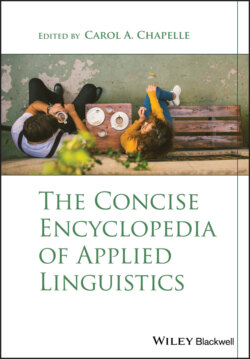Читать книгу The Concise Encyclopedia of Applied Linguistics - Carol A. Chapelle - Страница 193
Minority Languages
ОглавлениеThe social position of a few minority languages the world over has undergone an enormous change in the last few decades, a period in which, after a mammoth fight to recover their rights, speakers have managed to regain the social representation denied to them for many years. School has thus become one of the main social spaces where minority languages are again taken into account and are playing an active role in preparing the next generation of students. However, the language attitudes held by majority and minority groups have a direct impact on language policy for the minority language.
The importance of institutions' commitment to bilingual education and the latter's impact on language attitudes and motivation is clearly reflected in the case of Basque, a language spoken in two autonomous communities in the north of Spain (Basque Autonomous Community—henceforth BAC—and Navarre) and the south of France (Northern Basque Country, henceforth NBC). There are important differences between the three regions into which the Basque‐speaking community is split and which influence Basque's position in the education system of each of them: Basque is fully co‐official with Spanish throughout the BAC, it is fully co‐official only in the north of Navarre (it has no official status in the center and south), whereas in the NBC only French is identified legally as the official language.
There are remarkable differences between the regions regarding how much support is given to Basque (Basque Government, 2016). Analysis of the 1996–2016 period shows that the BAC government's efforts to normalize the situation of Basque have led to a substantial change in the attitudes of the population. In this normalization process the set of rules governing the balanced use of both Basque and Spanish had been previously established, including the implementation of bilingual programs at schools (for further information see Lasagabaster, 2017). As a result of this, there was an enviable rise of 19% (from 46% to 65%) among those positively disposed, especially among the youngest age group (below 25) due to the positive impact of the bilingual programs available. The situation in the NBC is just the opposite, as the 13.7% decrease in positive attitudes (from 49% to 35.3%) is accompanied by 17.1% of negative attitudes. In Navarre, the situation also appears to have worsened, as 39.1% of Navarrese are still opposed to Basque promotion efforts, whereas the percentage of those who support them (33.3%) has also decreased: a 4.7% decrease since 1996 when they represented 38% of the Navarrese population. Although support for efforts to promote Basque is still 2% higher in the NBC than in Navarre, the drop in positive attitudes over 20 years in the NBC is sharper (13.7% versus 4.7%).
The Basque case clearly demonstrates how important the combination of speakers' and institutions' efforts is not only to maintain, but also to revive and, above all, normalize a minority language. Regarding bilingual education, the conclusion to be drawn is that, if the regional language has high status in the eyes of the students, they will be more motivated to learn it and will harbor more favorable attitudes. Therefore, the political dimension comes to the fore and the psychological merges with the political, so that attitudes become part of a multilayered and dynamic scenario related to identity construction and language ideologies which has individual, group, and societal dimensions. Nowadays there is no doubt that the political dimension of language motivation has to be considered (Lasagabaster, 2017).
